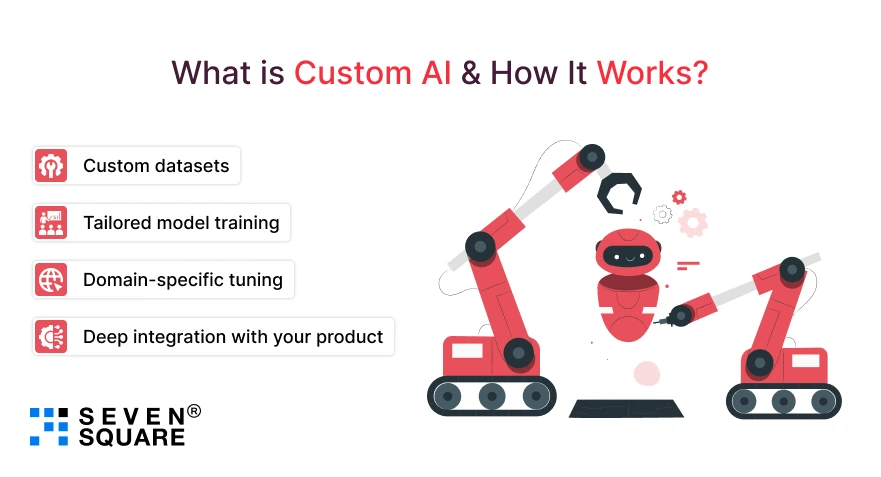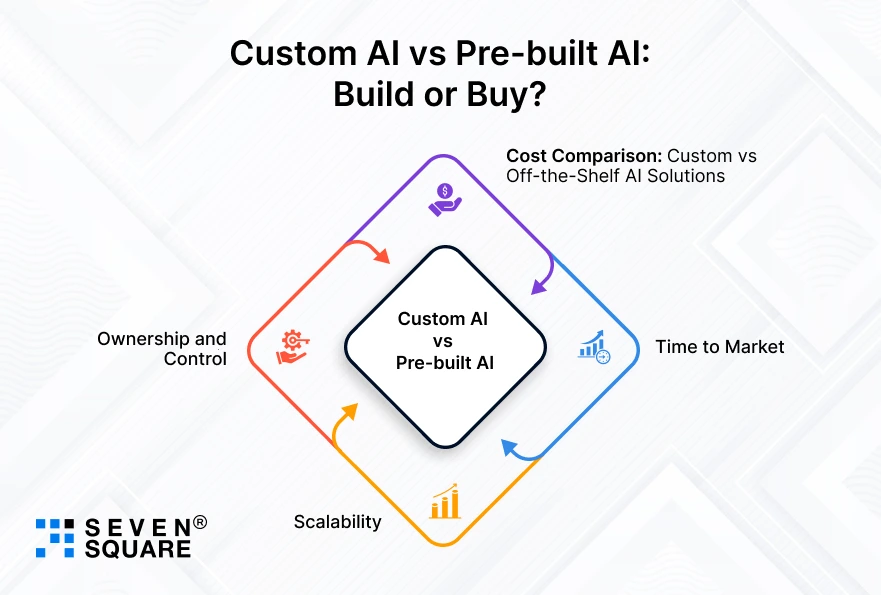Imagine this: You’re building a new app, maybe it’s a healthtech platform, an eCommerce tool, or an internal analytics dashboard.
You know AI could make your product smarter, maybe through predictive insights, personalization, or natural language understanding.
Then a question comes: Should you build a custom AI solution according to your app’s needs, or go with a ready-to-use, pre-built AI tool that promises faster integration?
We’ve worked with enough founders across industries like logistics, fintech, eCommerce, and healthcare projects to know this dilemma is real.
And the wrong decision?
It can set you back months and burn your budget.
Here in this blog, we will try to explain custom AI vs pre-built AI differences in detail.
So you can choose whether you want to go for off-the-shelf AI solutions or custom AI solutions.
What is Custom AI & How It Works?

Custom AI solutions are personalized artificial intelligence systems built specifically for your business needs, data, workflows, and product goals.
Unlike generic AI platforms, custom AI development gives you the freedom to train models on your data, fine-tune the logic, & integrate them smoothly into your software.
These solutions are engineered from the ground up and usually involve:
- Custom datasets
- Tailored model training
- Domain-specific tuning
- Deep integration with your product
Custom AI implementation is ideal for apps where AI is the foundation of the experience.
We’ve built custom AI for everything from fraud detection in fintech to predictive logistics in supply chain platforms.
Learn more about the Learn more about the roadmap for custom mobile app development. .
What Pre-built AI Means for Your App’s Roadmap?
Pre-built AI tools (also known as off-the-shelf AI solutions or ready-to-use AI tools) are plug-and-play systems created by third-party providers like Google,Amazon,OpenAI, or Microsoft.
These platforms offer pre-trained models for common AI tasks:
- Image recognition (e.g., Google Vision)
- Speech-to-text (e.g., Amazon Transcribe)
- Sentiment analysis (e.g., Azure Text Analytics)
- Language generation (e.g., ChatGPT,GPT-4)
They allow fast integration without needing to build or train anything from scratch.
For many early-stage apps or MVPs, this approach lets teams validate features quickly and affordably.
Pros and Cons of Building Custom AI Solutions for Your App
Explore the pros and cons of custom AI solutions to determine if it’s best for you or not.
Advantages of Custom AI Solutions
- Custom Fit: Built around your business logic, not someone else’s assumptions.
- Scalable Architecture: You own the model pipeline, so it can grow as needed.
- Differentiation: Competitive edge through unique features others can’t copy.
- Full Ownership: No vendor lock-in; you control training, data, and deployment.
- Custom AI scalability: Better performance under your specific load and conditions.
Disadvantages of Custom AI Solutions
- Higher Initial Cost: Requires investment in development, training, and data preparation.
- Longer Time to Market: Building, testing, and tuning models takes time.
- Maintenance Responsibility: You’re responsible for updates and bug fixes.
Despite these challenges, when we work on custom AI solutions, the goal is long-term ROI.
One of our clients replaced a costly API subscription with a custom NLP model and saved over 60% in monthly costs while improving accuracy.
Pros and Cons of Using Pre-built AI Tools in Your Product
Learn about the pros and cons of using pre-built AI tools in your solution.
Advantages of Pre-built AI Tools
- Faster Time-to-Market: Integrate in hours or days, not weeks.
- Lower Upfront Costs: Most offer pay-as-you-go models.
- Test Before You Build: Great for MVPs or exploring product-market fit.
- Managed Infrastructure: No need to manage training, scaling, or performance tuning.
Disadvantages of Pre-built AI Tools
- Limited Customization: You can’t easily tweak the underlying model logic.
- Vendor Lock-in: If pricing or API policies change, you’re affected.
- Pre-built AI scalability limits: Usage-based pricing can skyrocket with scale.
- Lack of Control: Not ideal for regulated industries or sensitive data handling.
- No Unique Advantage: If competitors use the same tools, your app loses its edge.
We often see early-stage teams start with off-the-shelf AI solutions to validate demand.
But as user needs evolve, we help them migrate to custom AI development, combining the best of both worlds.
Custom AI vs Pre-built AI: What’s the Difference?
Here you can see the comparison between custom AI vs pre-built AI to determine which one is best for you.
| Feature | Custom AI Solutions | Pre-Built AI Tools |
|---|---|---|
| Flexibility | High: According to your use case. | Limited: Built for general use. |
| Integration Complexity | Higher | Lower |
| Initial Cost | Higher upfront | Lower upfront |
| Scalability | Built to scale with your product | Often limited to provider’s roadmap |
| Competitive Edge | Unique features possible | Same features as competitors |
| Time to Market | Longer | Shorter |
| Ownership & Control | Full | Vendor-dependent |
| Maintenance & Updates | Your team’s responsibility | Vendor-managed |
When to Choose Custom AI Solutions?
We recommend custom AI when:
- Your app has unique logic or workflows (e.g., custom document processing, dynamic pricing models).
- You need deep personalization, like behavior-based recommendations.
- You’re building a scalable platform where AI needs to grow with the product.
- You’re working in regulated industries where data control and explainability matter.
We’ve delivered custom AI development for a logistics company to improve last-mile routes with AI-powered predictions, and a fintech startup that needed fraud detection tuned to real-time transaction behavior.
With custom AI implementation, you’re not buying a black box.
You’re building intelligence that’s specific to your product, your customers, and your goals.
And yes, it takes more time. But it also gives you control, scalability, and long-term.
When You Should Use Pre-built AI Tools?
Pre-built AI tools work well when:
- You need a quick win or MVP validation.
- The use case is standardized (e.g., OCR, basic chatbots, keyword extraction).
- You’re on a tight budget or early in product development.
- You want to test AI’s value before investing in custom builds.
There’s absolutely nothing wrong with ready-to-use AI tools when used right.
We’ve seen startups speed up launches by using off-the-shelf AI solutions for tasks like sentiment analysis or spam detection.
Services like OpenAI, Google Vision, and AWS Comprehend offer powerful plug-and-play intelligence, and yes, we integrate those too.
But here’s the catch: The more your product depends on that AI, the more limitations you’ll run into.
You don’t own the logic, can’t always tweak the model, and if your competitor uses the same tool well, your “smart app” is no longer that smart.
Custom AI vs Pre-built AI: Build or Buy?

Let’s look at the key differences most people are looking for:
1. Cost Comparison: Custom vs Off-the-Shelf AI Solutions
- Custom AI solutions have a higher upfront cost, but they’re an investment in future adaptability.
- Pre-built tools cost less early on but often come with subscription pricing, API limits, and pay-per-call models that scale poorly.
- Example: One client started with a pre-built language model API. As usage grew, monthly bills hit 5-figures.
- We later replaced it with a custom NLP engine that cost less in the long run and gave them better control.
2. Time to Market
- Ready-made tools get you moving fast. But over time, you hit walls when trying to extend or customize.
- Custom solutions take longer to build, but once live, they integrate tightly and evolve with your app.
3. Scalability
- Custom AI scalability is far superior. You’re not bound by vendor throttling or feature roadmaps.
- You decide how to grow the model, whether that means retraining it weekly, running it on edge devices, or fine-tuning it for new markets.
4. Ownership and Control
- Build it, and it’s yours. You control everything from datasets to architecture.
- With off-the-shelf AI, you’re often subject to changing APIs, pricing, and licensing.
- In some industries (like healthcare or finance), this lack of control is a deal-breaker.
Ask These 5 Questions Before You Build or Buy AI
- Will AI be a core value driver for my app or just a support feature?
- Do I need fine-grained control over the data, models, or predictions?
- Can I afford potential lock-in with a vendor-provided solution?
- Do I expect usage to grow rapidly, and will costs follow?
- Will I need to explain how my AI works to customers or regulators?
The more you answer “yes,” the more likely custom AI is the better path.
Custom AI or Pre-Built AI: Seven Square Builds Both, Smartly
At Seven Square, we can help you implement the right AI solution: custom-built or pre-trained.
- We create custom AI solutions from scratch, trained on your data, according to your logic, and ready to scale.
- Or we plug in pre-built AI tools (like OpenAI, Azure AI, etc.) to get you fast results without the heavy lift.
- Our team of 50+ developers combines AI development with product thinking to build the best solution for you.
- From fintech to healthcare, we’ve delivered AI solutions that perform, adapt, and grow with your product.
Ready to make the right AI call for your business app? Contact Us Now!
Your Next Step: Making AI Work for Your Product
If AI is central to your product, and you want full control, long-term scalability, and differentiation, then invest in custom AI solutions.
Yes, it takes longer. But it gives you power.
If you’re at an early stage or AI is just one layer, then start with off-the-shelf AI solutions.
Learn, test, ship fast. Then rebuild smarter when you have proof and traction.
“You don’t need to future-proof everything, just the parts that define your edge.”
And if you’re not sure? That’s what we’re here for. We’ll help you choose smartly.
FAQs
- Custom AI is built from the ground up for your specific business logic and data, while pre-built AI (or off-the-shelf AI) uses existing, ready-to-integrate models for general use cases.
- Custom AI offers more flexibility, but pre-built AI is faster to deploy.
- You should choose custom AI when your app requires domain-specific intelligence, proprietary data training, or unique features like personalized recommendations, fraud detection, or complex NLP workflows.
- Pre-built AI tools are great for testing and quick wins, but they may lack the flexibility and scalability you’ll need long-term.
- As your product matures, you might outgrow them.
- Yes, custom AI typically involves higher upfront costs due to model training, data engineering, and deployment.
- But it gives long-term value, performance, and full control.